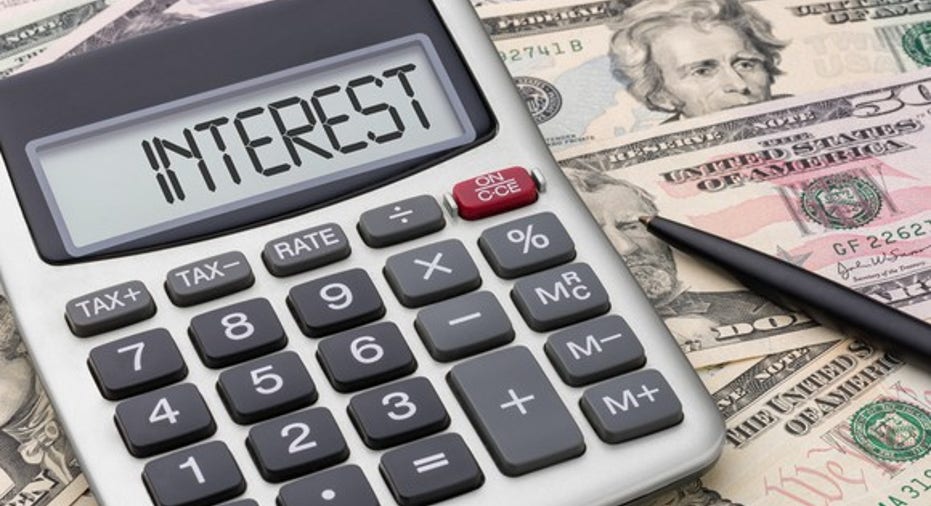Here's an Easy Way to Estimate Compound Interest

When we hear the term "millionaire," it's easy to conjure up images of the nation's elite. But believe it or not, there are actually millions of millionaires in the country, and it's not because they all inherited huge fortunes or worked high-powered jobs. Often, accumulating wealth is a simple matter of taking advantage of compounding.
Compound interest is a reward for investing your money. When your money earns interest, that interest is added to your total account value so that when future interest accrues, you're getting interest on the interest you've already earned. It might sound confusing (especially given the number of times we just used the word "interest"), but in its most simplified sense, compound interest is interest on top of interest -- and it's what helps your savings grow. There are a lot of options for earning compound interest, but if you want to know what it'll take to double your money, we have a calculator that uses the rule of 72 to arrive at an instant answer.
IMAGE SOURCE: GETTY IMAGES.
The rule of 72
The rule of 72 is an easy way to determine how long it will take for your investment to double based on a fixed rate of return. To use the rule, simply divide 72 by your anticipated annual return (or your average annual return).
Imagine you have a stock-heavy portfolio. It's fair to assume that your investments will give you an annual 8% rate of return, as that's actually a bit below the stock market's historical average. So if we divide 72 by 8%, we come up with a nine-year window to double our money.
While the rule of 72 is a pretty simple concept, it helps to play around with different investment scenarios to see how long it might take to double the value of your portfolio, and to that end, we have a tool that can help:
* Calculator is for estimation purposes only, and is not financial planning or advice. As with any tool, it is only as accurate as the assumptions it makes and the data it has, and should not be relied on as a substitute for a financial advisor or a tax professional.
To use this tool, simply input the value of your portfolio, your anticipated return, and your marginal tax bracket. From there, our calculator will tell you how long it'll take to double your investments' value.
One thing to keep in mind is that if you're investing with a tax-advantaged retirement account, like an IRA or 401(k), your marginal tax bracket is actually irrelevant. That's because these accounts aren't subject to taxes on earnings year after year. Now if you're using this tool and aren't saving with a tax-advantaged account, you'll need to include your marginal tax rate. Otherwise, you can leave that number at 0%.
Start early, save big
Compounding can be your best friend when it comes to retirement savings, especially if you start putting money aside early on in your career. The more time you give your money to grow, the more sizable a nest egg you stand to build.
But don't take our word for it. Check out the following table, which shows what your savings might grow to depending on when you first start out:
TABLE BY AUTHOR. ASSUMES AN AVERAGE ANNUAL 8% RETURN.
As you can see, giving yourself 40 solid years to save allows you to take $96,000 in base contributions and grow it into $622,000. That's a $526,000 gain. But the longer you wait to start saving and investing, the less opportunity you'll have to take advantage of compounding.
Choose your investment wisely
One final thing to keep in mind about investing is that the higher a return you're able to generate, the sooner you'll double your money. While stocks certainly aren't the safest investment out there, they've historically delivered some of the highest returns. When you think about how to invest your savings, be sure to weigh the risks involved against the potential upside. Bonds, for example, are typically a far less volatile choice, but they might only deliver half the return of a stock-focused portfolio (if that).
Seeing what it takes to grow your money can help you make smart saving and investment decisions. It pays to run through different scenarios and see how much wealth you might come away with if you play your cards right.
The $16,122 Social Security bonus most retirees completely overlook If you're like most Americans, you're a few years (or more) behind on your retirement savings. But a handful of little-known "Social Security secrets" could help ensure a boost in your retirement income. For example: one easy trick could pay you as much as $16,122 more... each year! Once you learn how to maximize your Social Security benefits, we think you could retire confidently with the peace of mind we're all after.Simply click here to discover how to learn more about these strategies.
The Motley Fool has a disclosure policy.



















